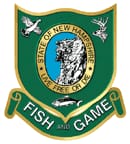Bear Activity High: New Hamphire’s Homeowners and Campers Should Take Precautions
OutdoorHub 06.20.12

Bears seem to coming out of the woodwork in New Hampshire these days. The New Hampshire Fish and Game Department is dealing with numerous bear complaints from around the state, many of them involving female bears with cubs.
Last Saturday (June 16, 2012), a Grafton, N.H., woman was injured after encountering a bear with cubs on her deck while letting her dog out. Female bears are often protective when cubs are present, or when approached by a dog.
Because a person was injured in the Grafton incident, Fish and Game responded by setting a culvert (live bear) trap near the woman’s house for three nights, as protocol requires, to try to capture the bear if it returned. As of Wednesday morning (June 20, 2012), the bear had not returned and the trap has been removed. Wildlife officials consider it unlikely that the bear will return to the site. No additional trapping is planned at this point in time.
June is often a busy month for bear activity, but this year is unusually so, according to USDA Wildlife Damage Specialist Rob Calvert. “The early spring has fast-forwarded these bears into July feeding behaviors, but the wild berry crop won’t be ready for another month,” said Calvert. “So they are panhandling – coming out of the woods, often with cubs, to seek out easy sources of food near houses and farmyards for themselves and their young.”
Early summer represents a somewhat lean time for bears, according to Andy Timmins, Fish and Game bear biologist. Last fall’s acorns have turned into woody sprouts. Lush spring vegetation has hardened off and is less valuable to bears. Most of the summer fruits that provide food for bears will not be available for a few weeks. “This period of low food abundance causes bears to search out high-quality, readily available foods provided by humans, and is the main reason why the majority of bear complaints in New Hampshire occur during June and July,” says Timmins.
The high level of bear activity this year means it is more important than ever to remove any bear attractants from your property. Although black bears are generally shy and usually avoid humans, they are opportunistic and will search for human food supplies when natural foods are not available. Birdseed, unsecured garbage and pet food all can be big temptations for bears.
Many backyard chicken operations in New Hampshire have been targeted by bears this year, too. “If you’ve got chickens, you need to protect them by using electric fencing or a very sturdy enclosure,” said Calvert.
“Above all, the public must understand that it is illegal to intentionally feed bears in New Hampshire,” said Timmins. “Intentional feeding can cause problems in residential areas and can result in fines. It also threatens the life of the bear, which may have to be destroyed if it becomes a nuisance animal habituated to human food sources. It’s unfortunately often true that ‘A fed bear is a dead bear.’ So if you love bears, don’t feed them.”
The No. 1 rule for avoiding conflicts with bears while hiking and camping is to maintain a clean campsite. All food, garbage and aromatic items (like toothpaste and other toiletries) should be stored out of reach of bears. Do not store these items in your tent. If car camping, keep all food and coolers in a building or vehicle with the windows rolled up. If camping at a remote site, bring rope to properly hang these items. Use food canisters at remote sites when available. To assist visitors, the Androscoggin Ranger District in Gorham has a limited number of bear-resistant food canisters that are available on a first-come, first-served basis for up to five days. For more information on this program, go to http://www.fs.fed.us/r9/white.
Fish and Game recommends that people take the following action to reduce the chances of a bear visiting your home or campsite:
- Stop all bird feeding by April 1 or as soon as snow melts.
- Clean up any spilled birdseed and dispose of it in the trash.
- Secure all garbage in airtight containers inside a garage or adequate storage area, and put garbage out on the morning of pickup, not the night before.
- Avoid putting meat or other food scraps in your compost pile.
- Don’t leave pet food dishes outside overnight.
- Clean and store outdoor grills after each use.
- Do not leave food, grease or garbage unsecured around campsites.
- Store food and coolers in a closed vehicle or secured area while camping.
- Finally, never intentionally feed bears!
“During these challenging times, we don’t want to forget the amazing ecological, cultural and recreational values that bears represent to our state and citizenry,” said Ellingwood. “Our ability to maintain bears in a positive light is largely impacted by the behavior of people. Anything the general public can do to keep our wild bears wild will contribute to the future well-being of this invaluable wildlife resource.”
If you have questions about bear-related problems, you can get advice by calling a toll-free number coordinated jointly by the U.S. Department of Agriculture’s Wildlife Services and the New Hampshire Fish and Game Department: 1-888-749-2327 (1-888-SHY-BEAR). For more information on preventing conflicts with black bears, visit http://www.wildnh.com/Wildlife/Somethings_Bruin.htm.

